Rose Bowl road trip in ‘Gulley’s Rocket’
A picture can say a thousand words. But sometimes you need more.
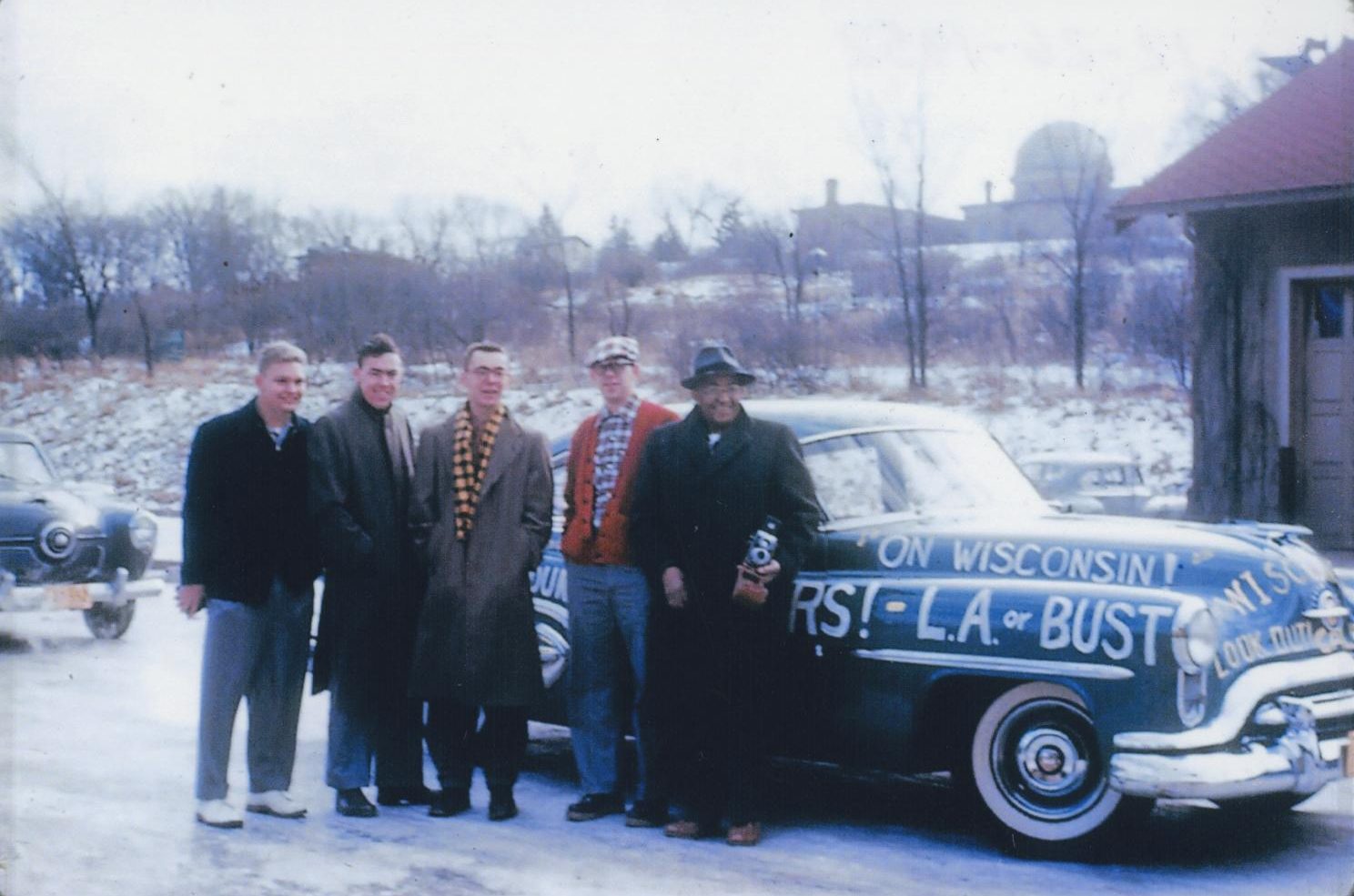
In the midst of photos from past Badger Rose Bowls is one of Carson Gulley, a civil rights pioneer and chef at University Housing for 27 years, with four UW-Madison students. It was Friday, Dec. 26, 1952, and the group was bound for Pasadena. They stand in front of Gulley’s car – you can see Washburn Observatory in the background.
“The Rose Bowl trip was one of many great times I’ve had in my life,” writes William Trickel in a letter accompanying photos of the trip that he donated to University Archives. “We enjoyed each other’s company. After my student years I would occasionally stop at his home when I was in Madison. He was always a gracious host and good friend.”
Before the trip to Pasadena, Gulley had made his way from Arkansas to Wisconsin over many years.
He was born in 1897 in Nevada Township, Arkansas, one of 10 children. His parents had been slaves and later became sharecroppers. Gulley was just 6 years old when he learned how to pick cotton. His parents emphasized education and Gulley graduated from high school in just two years, later returning to teach.
“I found out early that all you have to do to learn is to use your eyes and your ears,” Gulley said.
But he wanted to learn a new trade. He took a job as a dishwasher and went from cleaning up after meals to preparing them when the regular chef missed work due to a hangover – again. In 1926, Gulley was working the summer at Essex Lodge in Tomahawk, Wis. As the story goes, Don Halverson, director of University Housing, was passing through when a thunderstorm hit. He sought refuge and food at the Essex, but the kitchen was closed. He asked whether someone could rustle up a sandwich. Gulley instead prepared a full meal. Halverson was impressed – and full. He visited with Gulley after the meal and invited him to fish with him the next morning and then to lunch. And dinner. Halverson offered Gulley a job at UW–Madison, which Gulley started that December.
While not a student, Gulley and his wife, Beatrice, were residents of Tripp Hall. They’d been turned down for housing in several neighborhoods, so the university built them a small basement apartment in Tripp, the same hall where the students in the Rose Bowl picture all lived.
They brought white poster paint and wanted to decorate Gulley’s car for the trip.
“Yeah, go ahead and do it,” Gulley said.
They named her “Gulley’s Rocket” and headed for California with Gulley at the wheel. Trickel’s letter details driver switches, stops for food and an oil change in Amarillo, Texas along Route 66, “the Mother Road.”
“The car radio was playing most of the way going and coming,” Trickel writes. “I remember one song that was played over and over by every station, little Brenda Lee, age 9, singing, ‘I’m Sorry.’ We must have heard it at least a thousand times.”
They stopped to buy a bag of oranges along the way at a roadside stand.
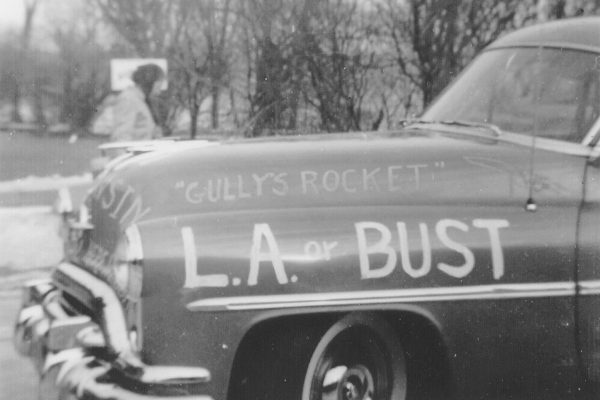
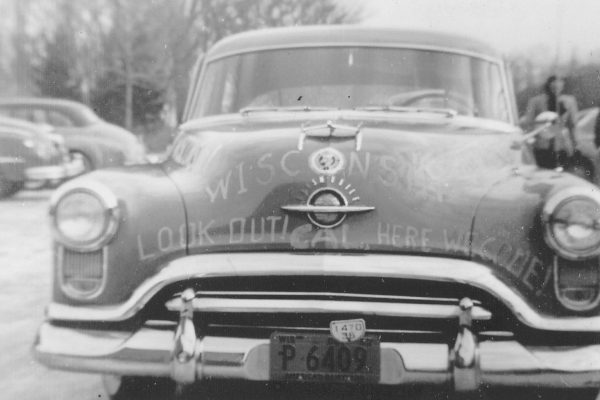
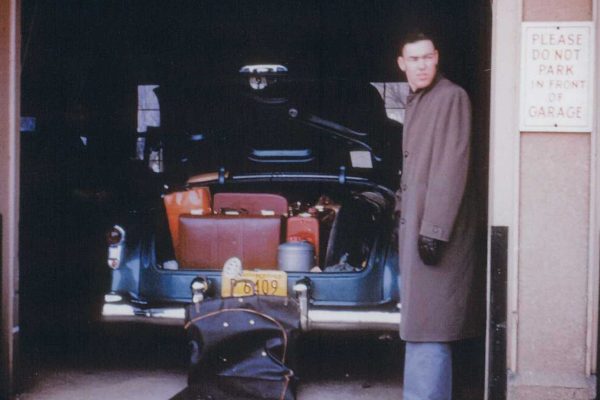
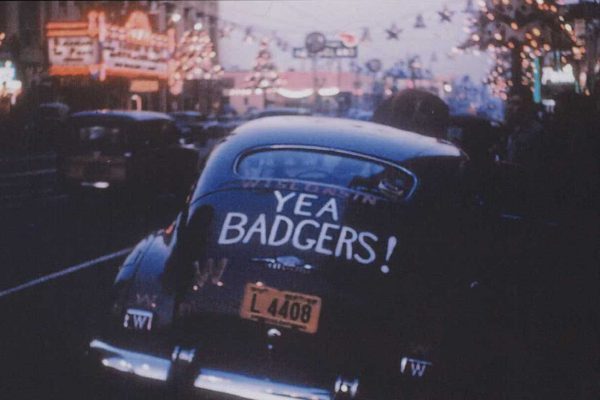
In Los Angeles, the students were meeting up with other students while Gulley met up with his wife, who had arrived a few days earlier.
Trickel later reunited with Gulley and his wife at the Los Angeles Mirror, which was doing a story and wanted a picture of Trickel and the Gulleys. It appeared in the paper Dec. 31, 1952.
The trip was enjoyable despite the outcome of the 1953 Rose Bowl game, which the University of Southern California won, 7-0.
“In the third quarter of the game, Rudy Bukich passed to Al Carmichael in the end zone for a touchdown and the only score of the game,” Trickel writes. “Wisconsin missed two or three chances to score but no dice.”
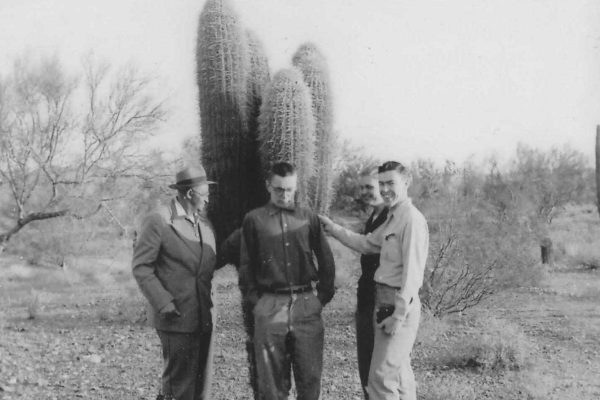
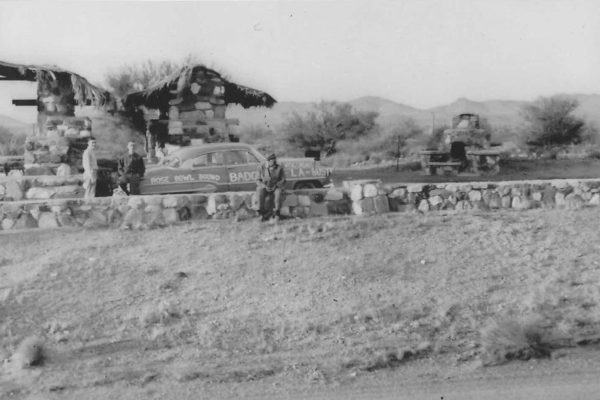
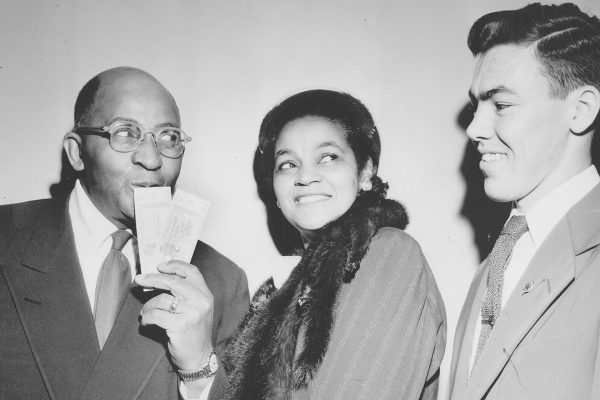

After the game, the small group packed up another bag of roadside oranges and started out for home. But alas, an inspection station officer told them they couldn’t pass the California border with any fruit.
“He said either eat them here or throw them in the waste container,” Trickel writes. “We thought about it for a minute and decided to eat them. We pulled off to the side and everyone ate oranges until they were gone. We were soon on our way again.”
They stopped in Albuquerque to visit Trickel’s uncle and had some leftover Christmas cookies. Then they were rolling along to Madison, hearing Brenda Lee and her apology many more times along the way.
“It was a great trip with a great bunch of guys. Everybody really enjoyed themselves,” Trickel writes. “We all got together again a couple of weeks later for dinner at the Gulleys’ apartment. Carson cooked a sumptuous meal for us. It was the only time in my life I had possum. You know the old saw, ‘It tastes like chicken.’ We had another great time discussing the trip and looking at each other’s pictures.”
As a student, Trickel worked with Gulley as a “food trucker” and ticket checker at Van Hise, the dining hall for Tripp and Adams residence halls. In 1966, Van Hise was renamed Carson Gulley Commons in his honor. It was the first building named for a person of color at UW–Madison and the first named after a civil service employee rather than a faculty member or administrator. It was rededicated in 2013 after being renovated.
A picture can say a thousand words – here are a few more from Gulley, just in time for the Rose Bowl.
“Whatever you do, whether in cooking or anything else, to do a good and rewarding job you must strive constantly for perfection,” Gulley said in an interview. “Though perfection is seldom attained, this constant striving is what raises an individual from mediocrity to the level of outstanding accomplishment.”